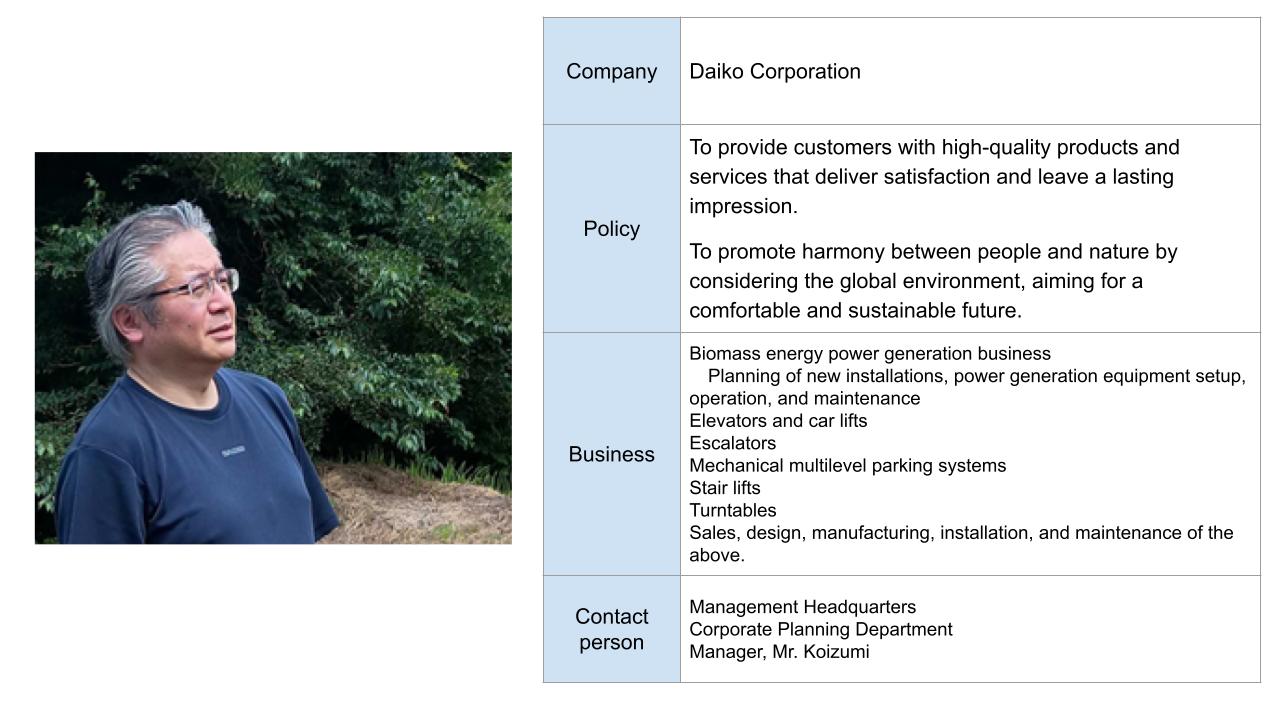In response to the growing issue of copper wire theft, Daiko Corporation has introduced Asilla’s AI-based monitoring solution, “Solar AI asilla”, at its solar power plants.
In this interview, we explore the challenges faced in conventional security, the reasons behind selecting solar AI asilla, the tangible benefits of implementation, and their future expectations.

Asilla: Thank you for joining us today. First, could you tell us about the reality of copper wire theft at solar power plants? What kind of incidents have you experienced?
Daiko: Thank you for having us. Copper wire theft has become a serious and recurring problem. In one incident, we suffered damage worth tens of millions of yen. Copper is valuable, and beyond the cost of the material itself, recovery takes a lot of time and money. During that time, our power generation operations are completely halted, leading to a significant loss of electricity sales. It’s an issue that impacts the entire business.
Asilla: Were there limitations with conventional security methods?
Daiko: Absolutely. Solar plants cover large areas, and maintaining 24/7 surveillance with on-site personnel or remote monitoring centers is simply not realistic. Labor costs are rising, and fences are more of a safety measure against electrical hazards than a real deterrent. Even with surveillance cameras, thieves often avoid detection by changing the angle or bypassing infrared sensors once they know their location. Without constant watch, perpetrators can take their time. We’ve had to shift our mindset from thinking of solar as “effortless, safe investments” to recognizing them as “at-risk assets” that demand strong self-defense strategies.
Asilla: How did you come across “solar AI asilla” amidst this situation?
Daiko: We were actively exploring alternatives to traditional security and came across an online article about Asilla. That led us to your Kanda office, where we met Mr. Shinagawa, the project lead for solar AI asilla, and learned about the solution in detail.
Asilla: Did the cost of implementation pose any concerns?
Daiko: Of course, the initial investment was significant. But when we compared that to the recurring cost of conventional security and the potential damage from theft—including restoration and downtime—we saw clear value. From a cost-effectiveness perspective, the system made perfect sense as a forward-looking investment.
Asilla: What made you ultimately decide to implement solar AI asilla? Were there any concerns during the process?
Daiko: The decisive factor was your hands-on support and serious approach to theft prevention. To be honest, we were initially worried about false alarms with an AI system. But your team carefully listened to the specific conditions at our site, and proposed a comprehensive plan—from optimal camera placement to integration with the security company. That gave us the confidence to proceed.
Asilla: Our goal is to work closely with customers to build the optimal monitoring framework.
Daiko: And you certainly did. You even introduced us to a reliable security firm. With both AI detection and prompt human response in place, we had the full system we needed. Asilla’s collaborative approach truly gave us peace of mind.
Asilla: Since implementation, what results have you seen? What’s been the most significant change?
Daiko: Without question, the most important outcome is that theft incidents have dropped to zero. We no longer have to operate under constant anxiety and can now focus fully on managing the plant.
Asilla: That's fantastic to hear. How about detection accuracy and false alerts?
Daiko: While false alerts haven’t been completely eliminated, they’ve been significantly reduced with each system update—especially alerts triggered by animals. And because the AI catches movements too subtle for the human eye, we almost never miss real incidents. Even when a false alert occurs, the review process is quick, and coordination with the security company is seamless, minimizing the burden on staff. The result is a dramatic improvement in operational efficiency.
Asilla: We've heard that the 24/7 monitoring setup has also contributed to a strong sense of security.
Daiko: Absolutely. Knowing the system is monitoring constantly, and that professional responders are on standby, has been a major reassurance. We've reduced on-site workload and reallocated that time to further enhancing plant maintenance. It’s a win-win in terms of safety and efficiency.
Asilla: Lastly, do you have a message for other solar power operators considering solar AI asilla?
Daiko: Theft prevention is an urgent priority for solar operators today. solar AI asilla isn’t just a surveillance system—it's a total solution. Asilla works closely with clients to decide on installation layouts, introduces partners like security companies, and keeps improving the system quality. It’s not something competitors can easily replicate. While other sensor-based systems may be cheaper upfront, solar AI asilla delivers far greater value when you factor in its comprehensive capabilities—from detection to response.
Asilla: How do you view the potential of solar AI asilla across the solar industry?
Daiko: With its specialized features like outdoor behavior recognition, vehicle detection, and cable tamper detection, solar AI asilla is tailor-made for copper theft prevention. Asilla’s continued commitment to delivering high-quality, end-to-end services will undoubtedly contribute to reducing theft across the entire solar industry.
Asilla: Any final thoughts or expectations for Asilla?
Daiko: We look forward to further improvements in solar AI asilla and hope that Asilla continues to lead the field in theft prevention. By enabling more solar operators to run their businesses with confidence, you're supporting the entire industry’s sustainable growth.
Asilla: Thank you very much for sharing your valuable insights with us today.